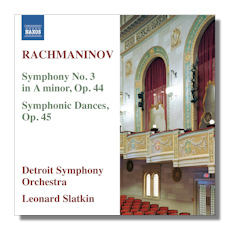
The Internet's Premier Classical Music Source
Related Links
- Rachmaninoff Reviews
- Latest Reviews
- More Reviews
-
By Composer
-
Collections
DVD & Blu-ray
Books
Concert Reviews
Articles/Interviews
Software
Audio
Search Amazon
Recommended Links
Site News
 CD Review
CD Review
Sergei Rachmaninoff

- Symphony #3 in A minor, Op. 44
- Symphonic Dances, Op. 45
Detroit Symphony Orchestra/Leonard Slatkin
Naxos 8.573051
This Naxos disc offers Rachmaninov's last two works, both of which are very important in his output even though they were largely ignored for decades. Today, the Symphonic Dances (1940) is programmed pretty regularly, although the Third Symphony (1936) is still nowhere near the standard repertory.
Regarding Rachmaninov's last symphony, it is a fairly solid work but much of its music – really, the last two of its three movements – will strike the listener as Rachmaninov with a toned-down sense of his post-Romanticism and a decidedly colder expressive manner. The first movement contains that big memorable alternate theme and is for the most part reminiscent of the composer of the heart-on-sleeve Second Symphony and tune-filled Second Piano Concerto. Leonard Slatkin makes about the best case possible here for the work, bringing out the lushness and colorful character of the opening panel and finding the greater lyrical depth in the Adagio middle movement. Actually, I think Rachmaninov invested as much thematic beauty and appeal here as in the first movement. It's just that it doesn't sink in as immediately – but it is ultimately just as rewarding. The lively middle section leads to quite a dramatic and effective climax, especially in this performance, and the lyricism in the outer sections, although with comparatively subdued emotions, is quite engaging. Slatkin captures the festive character of the finale with energetic and highly nuanced playing, making the best of this sometimes generic sounding Rachmaninov: when the music seems to be struggling for inspiration midway through the composer throws in the Dies Irae theme (he quoted or alluded to this ancient Roman Catholic melody in at least seventeen compositions!), and here it can't quite make the music into something memorable. Still, this movement comes across quite effectively, thanks both to Slatkin and his splendid Detroit Symphony.
They turn in fine work as well in the Symphonic Dances. This is a better work which Rachmaninov could just as well have called a symphony. The first movement has all the energy and rhythmic bounce you could want in the principal thematic material. The lyrical slow theme is given an effectively exotic treatment by the saxophone and then lushly rendered by the strings. The second movement waltz is mesmerizing in its suave darkness here and the finale begins with a zesty restlessness, with the Dies Irae once again appearing, now with a sense of ambivalence and menace. The whole movement is splendidly played and Slatkin invests the music with tension, while pointing up much significant detail often buried in other performances. The closing pages come on with a colorful sort of grimness and sense of excitement right through to the climax, and then you hear that ominous gong, its steely tones left to fade slowly away.
There has been much competition in these works from Ormandy, Previn, Ashkenazy, and many others. Slatkin himself recorded all the symphonies and the Symphonic Dances previously for Vox to general acclaim. This Naxos disc shows, if anything, that he is even better this time around and competitive with the best versions of these works. The Detroit Symphony, it must be noted, consistently plays at world-class level here, and I'm not sure one could cite more committed and accurately played performances of these works by any other orchestra. The sound reproduction is excellent and Keith Anderson's notes are, as always, highly informative. If you're a Rachmaninov admirer, this disc should probably be considered essential.
Copyright © 2013, Robert Cummings





















